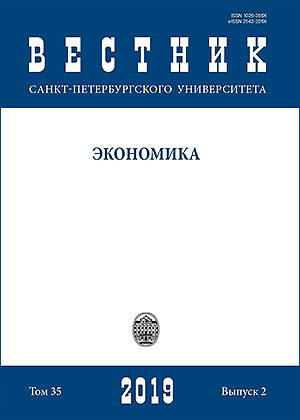Sustainability analysis of the cooperative form in Russian agrarian sector under institutional theory of the firm context
DOI:
https://doi.org/10.21638/spbu05.2019.204Abstract
Development of agricultural cooperation is called among the most priority directions of sup- port of SME in agro industrial complex not the first year. There is the fourth year of implementation of grant support of agricultural consumer cooperatives (ACC), annual plans for creation of new ACC are imposed, actions of regional programs of development and support of agricultural cooperation are complemented. However results of activity of agricultural cooperatives remain very modest — the quantity and economic turnover of ACC steadily decreases, and the share of the agricultural products sold by small farms through ACC makes no more than 1 %. It is inexplicable for an agrarian complex of the country where farms of small business produce from 30 to 45 % of all agricultural production. Among large integration schemes with participation of agricultural enterprises and other big types of farms the cooperative form in general is a big rarity. As cooperative is not the usual firm, the trust between members supported by the regulations developed plays rather large role, than strong management and without it the cooperative gradually turns into hierarchical structure. Surveys and calculations made by means of a method of the analysis of hierarchies conducted in three Russian regions show how weak and untied the existing system of the internal relations in consumer cooperatives is. Rural businessmen don't catch a difference between cooperative and private form of ownership and at the initial stage of work of cooperative agree to delegate all decision-making stuff. However in the process of activity cooperative members begin to have questions demanding acceptance of joint decisions. At this stage cooperative members have to learn how to find good solution among themselves and to develop the set of the norms and rules allowing cooperative to work effectively for their advantage, or to think of other form of relationship within not cooperative firm.
Keywords:
the theory of firm, the concept of trust, the theory of game approach, agricultural, SME in agriculture, members of cooperative
Downloads
References
References in Latin Alphabet
Translation of references in Russian into English
Downloads
Published
How to Cite
Issue
Section
License
Articles of the St Petersburg University Journal of Economic Studies are open access distributed under the terms of the License Agreement with Saint Petersburg State University, which permits to the authors unrestricted distribution and self-archiving free of charge.







